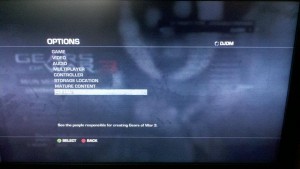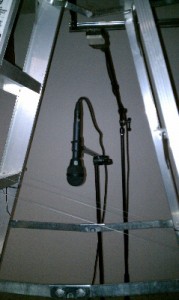October 3rd, 2011 | By Lance Hayes
Note to Readers
This article is from the collection of blogs I wrote for Keyboard Magazine’s website in 2010 and 2011. For more information about Keyboard Magazine please go to their website.
Cheers!
A Composers Perspective on Game Audio – Choice Notions
I recently reached out to my composer brethren and friends asking if they would be willing to talk about their successes as composers. To my delight, everyone I contacted was excited to throw down some knowledge.
I suggested that because the road to achievement is different for all of us, it would be great if they would discuss some of the simple ingredients they’d found that helped them to maintain momentum in their careers and helped them achieve their goals.
I got back outstanding responses. The range of detail in the replies was great, and everyone had valuable insights into what it takes to make it in the game field and beyond.
Enjoy!
Bill Brown (Tom Clancy’s Rainbow Six, CSI New York, Bill Brown Music) – “I’ve found over the years that building a career in scoring for film/tv/games seems to be about the quality of your work and the quality of your relationships. I’m always striving to take things to the next level with every project I work on, and part of that is listening as carefully as I can to the vision of the director/producers/writers/developers and then reflecting back to them what I heard so I know we’re all on the same page. Great friendships come out of that level of listening to not only the words that are being said, but also to the meaning that is beneath the words.
Integrity is key. Always be true to your word, work hard, and you’ll continue to gain respect. And as far as I’m concerned, that is the foundation for everything else. If you make a mistake, take responsibility for it as soon as you find out about it. Don’t wait. It will come around sooner or later anyway, and it’s much better to be proactive in everything you do.
Know what will work best in any given scenario (study the masters and continue to innovate), but also be original and have fun with whatever you’re working on. I’ve found when I really enjoy whatever cue I happen to be working on and get really excited about it, that’s usually the same reaction I get from my collaborators.”
Jason Graves (Dead Space series, jasongraves.com) – “Be as well-rounded as possible. Don’t just focus on music composition in games. The more you know about any and all things audio, the more you will have to offer when that potential gig comes in.
I spent the better part of three years doing nothing but recording radio VO and mixing television shows and corporate video, which included recording live handbells, a country band, and every Republican politician in the state of NC. It wasn’t the most glamorous audio work, but it did keep me busy and I got paid. And most importantly, I was working in the world of audio and making a living.”
Marty O’Donnell (Halo, Bungie)
- I took piano lessons since I was seven and didn’t quit in junior high
- I studied classical music and played in jazz and rock bands with friends
- I went to a music conservatory and got a Bachelor’s followed by a Master’s degree in music composition
- I wrote and produced music and sound for TV/Radio commercials, films, and just about anybody who would pay me
- I kept learning about new technology and paid close attention to what other composers were doing
- I learned how to collaborate with other creative people
- I played a lot of games
- I got lucky
Will Loconto (Sega’s The Incredible Hulk, X-Men: The Official Game, Will Loconto Music and Sound) – “I hear quite a few people telling aspiring composers to “pick one thing and spend most of your time honing your skill at that one thing.” Taking that path, you end up constantly counting on somebody wanting to pay you for your “one thing.”
My advice is to always be learning, and always be flexible. Be able to deliver many things, whether that means creating something yourself or knowing when to hire someone else to help.
Also, don’t devalue your work by working for free just to get a credit. There are strategic times when working at a discounted rate might help you, but getting a credit on a title few people ever hear about does very little to advance your career and usually sets expectations that you are willing to work for little or nothing.”
Christopher Tin (First ever Grammy awarded for video game music for “Baba Yetu” from Civilization IV, Christopher Tin) – “I think there’s a simple work ethic that I subscribe to that helps me out. I’m a big hockey fan, and I watch a lot of hockey on TV. When you see players get interviewed between periods, and the interviewer asks them how they felt about their last period, their last game, where they are in the standings, etc., the answer is always ‘We can’t think about that right now. We just need to think about the next shift and playing our game to the best of our abilities.
If you ask how that translates to a career in the music business, I’d say I try to have the same attitude. I try to focus on the project at hand and execute to the best of your abilities. I try to just focus on writing the best music I can at all times and not get distracted by all the other noise. Just focus on the job at hand. Take it one cue at a time, one section at a time, one measure at a time.”
Chris Rickwood (Ghost Busters the Video Game, Global Agenda, Chris Rickwood Music) – “One of my professors in college would always drill into me, “Practice the things you can’t do.” You know, learn something new then move on. It really applies to everything I do in my career. I’m constantly trying new techniques, reading new magazines, studying new music, watching new movies–anything to fill my creative bucket. Or when I’m writing, maybe I don’t open the same plug-ins, or use the same samples, or use the computer at all. I really crave things that I’ve never done before and really seek out something new every day.
There have been many times in my career when I’ve taken on a job and thought, “I’m not sure I can do this.” That’s when I would know it was going to be a fun project. Extremely stressful, but fun! And by the end I would totally level up my skills, so on the next project, I could push things even farther.”
Mick Gordon (The Last Airbender, Need for Speed Shift, Game Audio Australia) – “Number one is right place and right time, but you’ve often got to make sure you’re in the right place at the right time. I make sure I head to as many events, dinners, expos, and conferences as I can to meet new people and maintain existing relationships.
Consistency is probably the most important thing that someone should be aiming for. When you’re hired for gigs, clients shouldn’t have to worry if you’re going to deliver good stuff on time. Clients need to be able to rely on you to not just meet the brief but to exceed the brief and also exceed their expectations of you. If you’re easy to work with and are able to consistently deliver good material, then you’ll continue to get work.
Sam Hulick (Mass Effect 1 and 2, Heroes of Stalingrad, SoundGiants Inc.) – “What’s really helped me in my career is showing up at GDC every year and making valuable connections. And I don’t mean connections in the sense of having to know the right people, but what I mean is that it’s a small industry in the grand scheme of things, and everyone is connected somehow. Maybe the writer or level designer you really connected with goes back to his company and raves to the audio director about you. My point is, keep an open mind when networking, and don’t focus so much on business or landing work. Show up at GDC consistently so people remember you, be personable, make a good impression, and just have fun. The business stuff will happen naturally if you have the talent and professionalism to back you up.”
Jason Hayes (World of Warcraft, Diablo, StarCraft, musicbyjasonhayes.com) – “I think one of the best things you can do as a musician trying to find work is to be extremely flexible with the kind of jobs that you’re willing to take. In the past I’ve worked in a music store keyboard department, played in a band as a touring musician, worked in a recording studio, and also written jingles for radio ads. So being willing and able to do a number of different things has been a good strategy for maintaining a semi-stable career in music. Also, if you want to work in the game industry, it can a good idea to try to get in the door in the QA department, or if you have the skills for it, the IT department. Because once you’re in the door you can start to talk to the developers about your interest in writing music, and you’ll be way ahead of everyone else who has to resort to sending CDs in the mail. In my experience, those CDs stack up really high in someone’s office, and it’s hard to get noticed that way.”
Tom Salta (H.A.W.X., Prince of Persia: The Forgotten Sands, Red Steel, tomsalta.com) – “A diversity of projects always helps me build and maintain momentum. I get bored doing the same thing over and over, so I always welcome opportunities that present me with unique challenges. It can be quite nerve-racking at times and can get me out of my comfort zone, but I know that for me, that’s when I grow. It forces me to try and experience new things that I never have before. That’s one of my favorite parts about what I do–having the ability to explore different styles of music and interact with a wide range of musicians and cultures that I’d normally never have the chance to in everyday life.”
Thanks again to everyone that took the time to contribute their wisdom. My only regret is that there wasn’t an opportunity to pursue further input from additional friends in the industry.
And because I got everyone else to pony up, I figure I should add my own two cents. Here are some simple ideas that augment what has already been suggested by my colleagues and have served me well in my career:
- Throw yourself 110% into whatever project you have in front of you, no matter the size
- Take on all challenges with a smile
- Meet deadlines and beat expectations
- Write music that resonates
- Have heart and take chances
Pro Tip: Game Audio Book Club Suggestion
If you’d like to delve deeper into the world of interactive audio for games, look no further than Richard Steven’s and Dave Raybould’s The Game Audio Tutorial (Focal Press). It’s a newly released practical guide with projects and examples that cover both sound design and music implementation in games. It includes access to their website with tie-in lessons.











